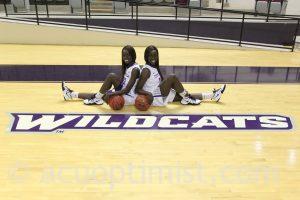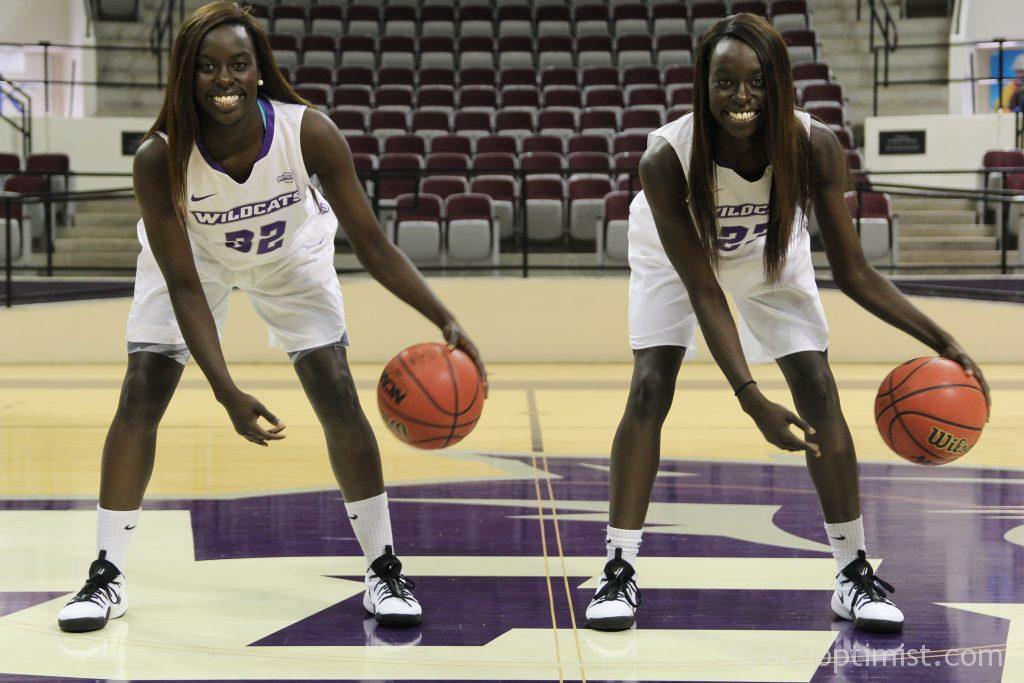The millennial generation grew up fascinated by what it would be like to have a twin. The Parent Trap, a 1998, two-hour hit and TV shows like “Full House” and “The Suite Life of Zach and Cody” also caused today’s younger generations to wonder what it would be like to have an identical best friend.
But what if the twins were athletes? How does a twin compete against someone who looks identical to them? What if one twin’s talent surpasses the other?
ACU athletics has nearly 350 student athletes. Six of them are identical twins. Allie and Michaela Hackett are red-shirt seniors on the women’s cross-country team, Austin and Brandon Lambright pitch for ACU baseball, and seniors Lizzy and Suzzy Dimba are starting forwards for the women’s basketball program.
 Allie and Michaela grew up in Cranston, Rhode Island. Every spring break, the family would travel to San Angelo to visit the girls’ aunt and uncle. When the Hackett twins were contacted by the head coach at ACU via email, they quickly realized ACU was less than two hours from their family spring break vacation spot.
Allie and Michaela grew up in Cranston, Rhode Island. Every spring break, the family would travel to San Angelo to visit the girls’ aunt and uncle. When the Hackett twins were contacted by the head coach at ACU via email, they quickly realized ACU was less than two hours from their family spring break vacation spot.
Allie and Michaela grew up playing sports and both have a competitive nature. Allie, however, has received more public attention than Michaela.
The Hackett twins love competition but they love each other more.
“The weird thing is, I don’t compete with her that much,” Allie said. “If it was a cross country race and I finish and someone is right behind me and it’s one of our rivals, I will try so hard to beat them. But, if I find out it’s Michaela, I’m gonna go, ‘Oh thank God, let her pass me.’”
What made Allie and Michaela feel that way towards one another? Was it science or was it the environment the girls grew up in?
Sherry S. Vinson, a developmental pediatrician at Texas Children’s Hospital in Houston, said it seems to be more environmental than genes.
“In families that nurture supporting each other, a twin or even a non-twin sibling is more likely to accept losing to a twin or non-twin sibling than to a person not in his/her family,” Vinson said. “Genes probably do play a role because it’s easier for someone to understand someone (else) and bond with them if the other person has the same strengths/weaknesses as (another person).”
Jim Hackett, Michaela and Allie’s father, said he and his wife have always marveled at how Allie and Michaela have always been so considerate of each other.
“As small children, if there was one cookie or one of anything left they would insist the other have it,” Jim said. “This was particularly odd for me, the dad, for whom, as one of seven children, there would always be a rumble for that last cookie. In much the same they have always been each other’s greatest defender.”
If Michaela or Allie would be spoken to sternly and the other heard it from another room, Jim said Allie or Michaela would fly into the room to defend the other sister.
“We’ve always tried to inculcate the value of consideration for one another and they’ve embraced that,” Jim said.
At the end of the course for Michaela and Allie, it doesn’t matter which one wins, as long as it’s one of them.
Two is better than one, if two work together.
Brandon and Austin Lambright grew up in Friday Harbor, Washington. When visiting ACU, the twins talked to the head baseball coach, Britt Bonneau, who watched the two throw during their visit.
Growing up, the twins played football, but after not playing a “fun position,” Austin and Brandon realized baseball was their true passion.
“Why would you want to play offensive line when you are 12 years old?” Brandon said. “You wanna be the guy who scores all the touchdowns and who gets all the girls.”
Growing up on an “island” made baseball opportunities scarce. In high school, Brandon would always receive MVP awards, while Austin came in second.
Austin said coming in second place to his brother was okay since Brandon was pitching and he was playing third base.
“If I was only pitching and he was only pitching and he got it (the award), then I would be like, ‘I’m getting it next year.’”
The competition between the Lambright twins helped get them to ACU.
“We use competition to our advantage,” Austin said. “We use competition to get better at things. If he throws harder than me, I’ll use that to work harder and throw harder than him.”
One individual who pushed Brandon and Austin was their mom.
“My mom would say, ‘You guys got to be different if you want to be somebody,’” Brandon said. “If it wasn’t for her, I don’t think we would be here.”
Identical twins can be opposite. Brandon is a right-handed pitcher, while Austin pitches with his left hand.
“We are mirror twins,” Austin said. “We never want to be on different teams.”
Two is better than one, if two work together.
 The Dimba sisters grew up in Lubbock, attending a high school where they were not the only twins on the basketball team their freshman year. The girls favorite sport growing up was soccer, but they chose to pursue basketball because it guaranteed more opportunities to get scholarships.
The Dimba sisters grew up in Lubbock, attending a high school where they were not the only twins on the basketball team their freshman year. The girls favorite sport growing up was soccer, but they chose to pursue basketball because it guaranteed more opportunities to get scholarships.
Recruiting twins seems an obvious choice for university coaches who want talent in more than one form, but some did not realize the Dimba sisters were twins.
“There was a school that was looking at me, but wasn’t looking at her – they didn’t know we were twins,” Lizzy said. “Some people think we are one player.”
Not only did coaches think the Dimba twins were one player growing up, but some fans who had followed them all four years at Lubbock Coronado thought they were just one girl too.
A co-worker of Lizzie’s and Suzzy’s mom supported the twins their entire high school career but did not realize Helen Dimba had twins until the girls were featured on a cover of a magazine or local newspaper. She realized they were twins after they had graduated.
But, who can blame the co-worker? Not only did Lizzy and Suzzy look identical, but they wore numbers 32 and 33 in high school. Now, the twins keep the tradition of confusing spectators, coaches, and competition by wearing 23 and 32 for ACU.
For ACU women’s head basketball coach, Julie Goodenough, having twins is not confusing, but makes coaching seem repetitive.
“It is double the trouble; what happens once, happens twice,” Goodenough said.
Basketball, like baseball, is full of competition among team members, but for the Dimba twins the competition factor does not creep into sibling rivalry.
“We want the best for each other,” Suzzy said. “If she scores 20 points and I score zero points, I’m like, ‘Good job, Lizzy.’ We get gratification out of each other’s success.”
The Dimba twins do not care who gets what award, as long as one of them gets it. They grew up playing one-on-one, but neither wanted the other to fail. Part of that comes from their parents.
“They taught us,” Lizzy said. “We are best friends. It’s just how we are as people. I never want her to fail.”
Dr. Vinson said identical twins occur in only three of every 1,000 deliveries worldwide. As rare as identical twins are it’s even more rare to have three sets in an athletic department comprised of 350 student athletes.
Two is better than one, if two work together.

